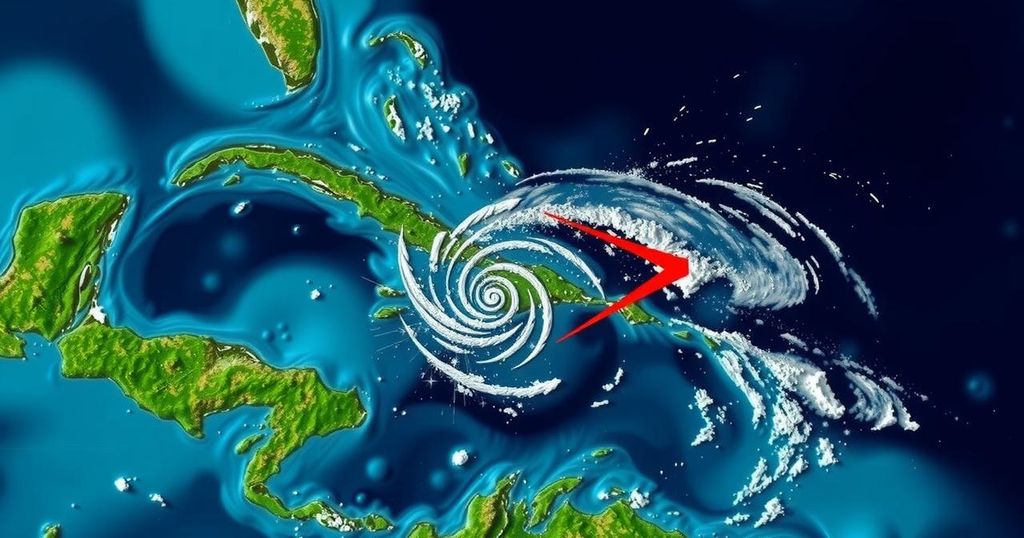Tropical Storm Oscar: A Historic Struggle for the Bahamas and Cuba
Tropical Storm Oscar is moving toward the Bahamas after making landfall in Cuba as a Category 1 hurricane, resulting in at least six deaths due to heavy rainfall. It is noted as the smallest recorded hurricane, with a wind field of only 6 miles. The National Oceanic and Atmospheric Administration forecasts an above-average hurricane season with several potential storms ahead.
Tropical Storm Oscar is currently advancing toward the Bahamas after having made landfall in Cuba as a Category 1 hurricane, resulting in at least six fatalities due to the torrential rainfall it brought. By Tuesday morning, Oscar was situated approximately 45 miles south-southeast of Long Island in the Bahamas, exhibiting winds of 40 mph and moving in a north-northeast direction at 12 mph, as reported by the National Hurricane Center in Miami. The storm is characterized as barely a tropical storm at present. Oscar is anticipated to deposit rainfall amounts reaching up to 5 inches across parts of the southeastern Bahamas, with isolated areas possibly receiving up to 8 inches. A tropical storm warning is currently in effect for the central and southeastern regions of the Bahamas. It is noteworthy that Oscar is recorded as the smallest hurricane in history, with a wind field spanning approximately 6 miles. The storm’s landfall took many by surprise, first impacting Grand Inagua Island in the Bahamas on Saturday and subsequently making landfall in eastern Cuba late Sunday. Michael Lowry, a noted hurricane specialist, remarked, “It’s not often we see a colossal failure in hurricane forecasting,” emphasizing that forecasting models did not predict Oscar’s intensification into a hurricane. Following its impacts in Cuba, where it dropped over 15 inches of rain and caused significant flooding and landslides, the storm has exacerbated the hardships faced by the nation, already struggling with a significant power outage that has led to small protests and stern government warnings against unrest. Oscar is designated as the 15th named storm and the 10th hurricane of the Atlantic hurricane season, which runs from June 1 to November 30. The National Oceanic and Atmospheric Administration has forecasted an active hurricane season, predicting between 17 to 25 named storms, including four to seven major hurricanes with Category 3 ratings or higher. Concurrently, Tropical Storm Kristy is observed in the Pacific Ocean, positioned 375 miles west-southwest of Acapulco, Mexico, with expected intensification to hurricane status imminently.
The Atlantic hurricane season officially commences on June 1 and concludes on November 30. It is characterized by periods of intense meteorological activity, which can result in the formation of tropical storms and hurricanes. This year, the National Oceanic and Atmospheric Administration has projected an above-average hurricane season, driven largely by exceedingly warm ocean temperatures. Tropical Storm Oscar, being the 15th named storm and 10th hurricane of the season, exemplifies this trend of heightened storm activity.
In summary, Tropical Storm Oscar has significantly impacted both the Bahamas and Cuba, causing fatalities and substantial rainfall leading to flooding and landslides. The historical characteristics of the storm as the smallest recorded hurricane have raised concerns regarding forecasting inefficiencies. The storm impacts coincide with an active Atlantic hurricane season, which could yield more significant storms given the current climatic conditions.
Original Source: www.seattletimes.com




Post Comment